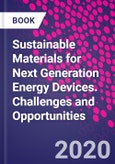Sustainable Materials for Next Generation Energy Devices: Challenges and Opportunities presents the latest state-of-the-art knowledge and innovation related to environmentally-friendly functional materials that can be developed for, and employed in, producing a feasible next generation of energy storage and conversion devices. The book is broken up into three sections, covering Energy Storage, Energy Conversion and Advanced Concepts. It will be an important reference for researchers, engineers and students who want to gain extensive knowledge in green and/or sustainable functional materials and their applications.
Please Note: This is an On Demand product, delivery may take up to 11 working days after payment has been received.
Table of Contents
Part 1: Electrochemical systems and energy storage
1. Electrochemical energy storage devices
2. Nanoarchitectured conducting polymers: Rational design and relative activity for next-generation supercapacitors
3. Current progress in the development of Fe-air batteries and their prospects for next-generation batteries
4. Functional material developments of fuel cells and the key factors for real commercialization of next-generation energy devices
Part 2: Energy conversion and harvesting
5. Graphene and its derivatives, synthesis route, and mechanism for photovoltaic solar cell applications
6. Solution-processed quantum dot-sensitized solar cell based on "green� materials
7. Colloidal quantum dots based solar cells
8. Future perspectives of perovskite solar cells: Metal oxide-based inorganic hole-transporting materials
9. Recent advancement in sustainable energy harvesting using piezoelectric materials
Part 3: Advanced sustainable energy, materials, and device concepts
10. An approach to designing smart future electronics using nature-driven biopiezoelectric/triboelectric nanogenerators
11. Polysaccharide-based polymer electrolytes for future renewable energy sources
12. Biomass-derived functional carbon nanomaterials for the development of futuristic energy devices
13. First-principles materials design for graphene-based sensor applications
14. Recycled silicon waste as a sustainable energy material








